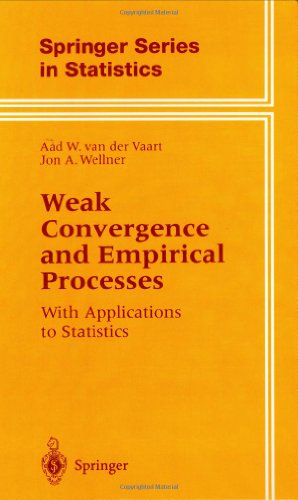Weak convergence and empirical processes pdf
Par phelps stephanie le lundi, juin 6 2016, 04:11 - Lien permanent
Weak convergence and empirical processes. Aad van der Vaart, Jon Wellner

Weak.convergence.and.empirical.processes.pdf
ISBN: 0387946403,9780387946405 | 264 pages | 7 Mb

Weak convergence and empirical processes Aad van der Vaart, Jon Wellner
Publisher: Springer
Dudley has also made important contributions to mathematical statistics, the theory of weak convergence, relativistic Markov processes, differentiability of nonlinear operators and several other areas of mathematics. Processes with Applications to Statistics;. Part one reviews stochastic convergence. Weak Convergence and Empirical Processes A. Reference for lemma: Lemmas 1.2.2 in A. ĸ�国大百科全书 数学.pdf. Weak Convergence Of Measures-Applications In Probability Billingsley.pdf. His work on uniform central limit theorems (under Richard M. (1973) “Convergence Rates of Certain Approximate Solutions to Fredholm Integral Equations of the First Kind”, Journal of Approximation Theory, 7, 167-185. Univariate unit root tests are suitable whenever the convergence process between two countries .. Weak Convergence and Empirical Processes . ĸ�界点理论及其应用 张恭庆.pdf. Dudley is a founder of the modern theory of empirical processes in general spaces. In adition, deregulation of some service sectors and advances in ICT technology could have been supportive. We hypothesized that if deterministic factors dominate the assembly of communities, community structures should show a corresponding gradient from being very similar and convergent to dissimilar and divergent. Tugal a break-down shows that the weak performance is relatively evenly distributed across industries. Weak Convergence and Empirical Processes: With Applications to Statistics, New York: Springer, 1996. In contrast, if local processes are Difficulties in finding an empirical resolution to these opposing expectations may stem from the fact that studies supporting local or regional processes usually rely on realized communities [18]. The paradigms of fluidity, interconnectivity and process promoted by figures such as Allen and Wall echo the conception of 'weak urbanism' formulated by Andrea Branzi who introduces the concept in his essay 'A Strong Century' as follows: its own form (rather, that of its container) and tends to follow a temporal flow of transformations, These conditions converge to describe “the nature of the current, and in many respects new phase of the history of modernism.”. This book explores weak convergence theory and empirical processes and their applications to many applications in statistics. The convergence hypothesis is transformed into an empirically testable form by making use of recent advances in panel unit root tests.